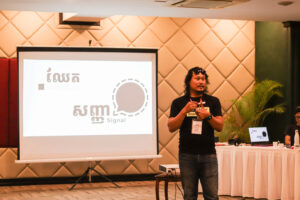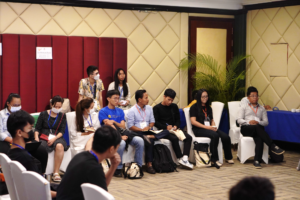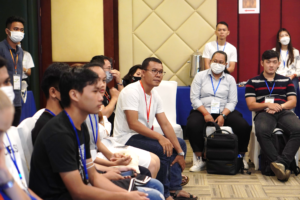Digital hygiene practices and smartphone protection
Mr. Chy Sophat, Barcamp Cambodia’s lead organizer and digital content creator, held two sessions on digital security during the 2022 Cambodia ICT Camp. Sophat has over ten years of experience organizing ICT and tech-related events and has developed in-depth knowledge and understanding of tech safety, digital literacy, and digital security. He is currently assigned to design a new ICT curriculum as part of New Generation School’s (NGS) study programs.

Mr. Sophat presented “Digital hygiene practice” and “Smartphones: data privacy and Protection” to stress the importance of improving mobile phone safety and digital security. 27 participants joined these engaging workshops to acquire knowledge thanks to the experiences that Mr. Sophat shared with the audience. Both sessions addressed digital security practices and shared some similarities. The scope of the first session, Digital hygiene practices, was broad and referred to many of the most commonly used technological devices and digital services. The second session Smartphones: data privacy and protection, addressed smartphone security specifically.

Like physical and personal hygiene, a series of digital hygiene procedures can prevent users from being exposed to (digital) threats and viruses when using their personal devices. Digital hygiene practices include using strong passwords, strengthening email and social accounts’ security with a two-factor authenticator protocol, using secure browsers, managing email accounts efficiently, using encrypted email platforms, and backing up essential files periodically. More importantly, Sophat suggested participants use a VPN to increase smartphone protection, enable the phone’s lock screen, periodically update the operating system, and ensure that the applications users download are reliable.
Digital hygiene improves online security, helps protect users’ personal data, and strengthens privacy on smartphones and other devices. Good digital hygiene also makes digital devices run smoothly and efficiently, said Sophat. He then asked participants about their digital hygiene practices with a list of dos and don’ts. Only a few people got all the options ticked. Finding out that most participants in these two panels did not have good digital hygiene habits was worrisome, and this small sample of people – who are tech-enthusiasts – could be indicative of low digital security skills among the broader Cambodian society – although more research is necessary to claim this. Teaching digital hygiene to Cambodia’s netizens is necessary for light of the National Internet Gateway (NIG) implementation, through which the government will gain control of data traffic in the country and will, in practice, create a surveillance state. Therefore, better digital hygiene practices would increase awareness of the NIG’s threats and would help mitigate, at least partially, some of its associated threats.
The speaker suggested participants use Protonmail as their primary email platform. Protonmail is an open-source platform focused on privacy and data protection that encrypts email communication. Using an encrypted email server increased data privacy, making it  less accessible to hackers. In addition to email accounts, Sophat also suggested using strong passwords and 2FA to level up email security. Sophat used the onion router (TOR) as an example of a safer platform to surf the internet. TOR is an open-source browsing platform allowing users to surf the internet anonymously. It hides users’ IP addresses, making it hard for hackers to track users’ identities and locations. It also encrypts browsing traffic and automatically deletes users’ browsing history.
less accessible to hackers. In addition to email accounts, Sophat also suggested using strong passwords and 2FA to level up email security. Sophat used the onion router (TOR) as an example of a safer platform to surf the internet. TOR is an open-source browsing platform allowing users to surf the internet anonymously. It hides users’ IP addresses, making it hard for hackers to track users’ identities and locations. It also encrypts browsing traffic and automatically deletes users’ browsing history.
Mr. Sophat also mentioned that using a VPN is highly recommended to protect users’ online activity, helping them to protect their data and remain anonymous online. Updating to the latest version of the smartphone’s operating system also mitigates the risk of data breaches, fixing security issues in previous software versions. Finally, Mr. Sophat also urged attendance to be careful when connecting their phones to public free Wi-Fi networks as they can compromise users’ anonymity and make their devices vulnerable to hackers.


